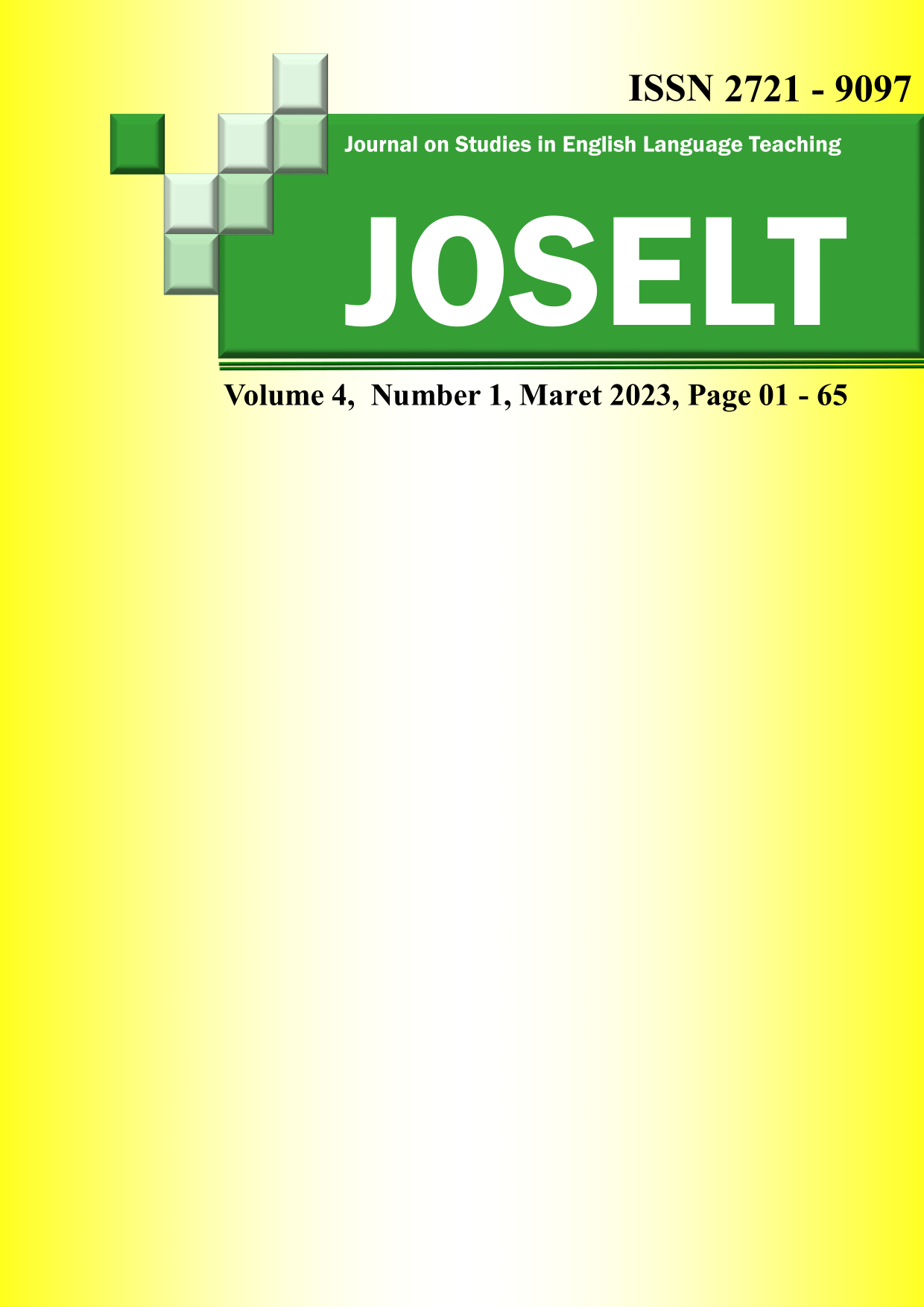BRAINSTORMING, EXPLORING, SHARING, TRANSFERRING KNOWLEDGE (BEST) AS AN EFFECTIVE STRATEGY TO UPRAISE STUDENTS’ WRITING SKILLS
Keywords:
effective, learning, strategy, writing skillAbstract
Writing ability is one of the abilities of a student to contribute what they know. Writing is a language skill that has an important role in human life. In writing students often encounter several obstacles, therefore, teachers are encouraged to implement appropriate teaching methods to ensure that the learning activities become effective. This study made use of a classroom action research design with two cycles of learning activities to improve students' writing skills through BEST strategy. Data were collected through pre-test, post-test, and questionnaire. The results showed that the writing skill of the students improved significantly from the first and second cycles when compared to the results of the pre-test. Therefore, the BEST strategy is considered very effective for teaching writing skills. This study implies that teachers should consider using BEST strategy to enhance students' writing skills.
References
Akyol, H., & Aktaş, N. (2018). The relationship between fourth-grade primary school students’ story-writing skills and their motivation to write. Universal Journal of Educational Research, 6(12), 2772–2779. https://doi.org/10.13189/ujer.2018.061211
Astawa, I. N., Mantra, I. B. N., & Widiastuti, I. A. M. S. (2017). Developing communicative English language tests for tourism vocational high school students. International Journal of Social Sciences and Humanities, 1(2), 58–64. https://doi.org/10.29332/ijssh.v1n2.43
Bukhari, S. S. F. (2016). Mind Mapping Techniques to Enhance EFL Writing Skill. International Journal of Linguistics and Communication, 4(1). https://doi.org/10.15640/ijlc.v4n1a7
Cahyani, I. A. M., Mantra, I. B. N., & Wirastuti, I. G. A. P. (2018). Employing Picture Description to Assess the Students’ Descriptive Paragraph Writing. Soshum : Jurnal Sosial Dan Humaniora, 8(1), 86. https://doi.org/10.31940/soshum.v8i1.797
Fathi, J., Derakhshan, A., & Safdari, M. (2020). The impact of portfolio-based writing instruction on writing performance and anxiety of EFL students. Polish Psychological Bulletin, 51(3), 226–235. https://doi.org/10.24425/ppb.2020.134729
Handayani, N. D. (2020). Teaching And Learning Strategies Practiced By Language Teachers To Actively Engage Their Students In Learning. International Journal Of Applied Science And Sustainable Development (IJASSD), 2(2), 15–21.
Handayani, N. D., Mantra, I. B. N., & Suwandi, I. N. (2019). Integrating collaborative learning in cyclic learning sessions to promote students’ reading comprehension and critical thinking. International Research Journal of Management, IT and Social Sciences, 6(5), 303–308. https://doi.org/10.21744/irjmis.v6n5.777
Handayani, N. D., & Widiastuti, I. A. M. S. (2019). Integrating Quantum Learning to Improve Students’ Linguistic Competence. International Journal of Linguistics and Discourse Analytics (IJOLIDA), 1(1), 22–28.
Khusniyah, N. L. (2019). Improving Descriptive Writing Ability Through Mind Mapping. Research and Innovation in Language Learning, 2(1), 75. https://doi.org/10.33603/rill.v2i1.1735
Mantra, I. B. N. (2017). Promoting the students ’ writing skill through folktales based learning activities. International Seminar on Language, Education, and Culture, October 2017, 78–82.
Mantra, I. B.N., Handayani, N. D., Pramawati, A. A. I. (2022). BEST Learning Model. Denpasar: Unmas Press.
Mantra, I. B. N., Arsana, A. A. P., Indrawati, I. G. A. P. T., & Laksmi, A. A. R. (2021). Exploring Efl Students’ Descriptive Paragraph Writing Ability Through Critical Assessment Process. International Journal of Linguistics and Discourse Analytics (Ijolida), 2(2), 51–57. https://doi.org/10.52232/ijolida.v2i2.35
Mantra, I. B. N., & Widiastuti, I. A. M. S. (2019). An Analysis of EFL Students’ Writing Ability to Enhance Their Micro and Macro Writing Skill. International Journal of Linguistics and Discourse Analytics (IJOLIDA), 1(1), 29–34.
Mantra, I., Bagus, N., Handayani, N. D., Made, I. A., & Widiastuti, S. (2021). Empowering Mind Mapping Strategy To Improve Students’ Writing Skills in the Efl Classroom. International Journal of Linguistics and Discourse Analytics, 3(1), 14–21.
Mehrdad, A. G., Alavi, S. M., & Khatib, M. (2016). The Effect of Collaborative Writing Practice on Efl Learners’ Writing Accuracy, Complexity and Fluency. Modern Journal of Language Teaching Methods, 6(1), 285.
Nair, S. M., & Sanai, M. (2018). Effects of utilizing the stad method (Cooperative learning approach) in enhancing students’ descriptive writing skills. International Journal of Education and Practice, 6(4), 239–252. https://doi.org/10.18488/journal.61.2018.64.239.252
Saddler, B., Ellis-Robinson, T., & Asaro-Saddler, K. (2018). Using sentence combining instruction to enhance the writing skills of children with learning disabilities. Learning Disabilities: A Contemporary Journal, 16(2), 191–202.
Shin, J. K., & Crandall, J. (Jodi). (2018). Teaching reading and writing to young learners. In The Routledge Handbook of Teaching English to Young Learners. https://doi.org/10.4324/9781315623672-13
Sihombing, S. O. (2013). Identifying Changing in Indonesian Values and its Impact to Indonesian Consumer Behavior. 36, 101–109.
Suparsa, I. N., Mantra, I. B. N., & Widiastuti, I. A. M. S. (2017). Developing learning methods of Indonesian as a foreign language. International Journal of Social Sciences and Humanities, 1(2), 51–57. https://doi.org/10.29332/ijssh.v1n2.41
Toba, R., Noor, W. N., & Sanu, L. O. (2019). The Current Issues of Indonesian EFL Students’ Writing Skills: Ability, Problem, and Reason in Writing Comparison and Contrast Essay. Dinamika Ilmu, 19(1), 57–73. https://doi.org/10.21093/di.v19i1.1506
Widiastuti, I. A. M. S. (2018). EFL students’ writing interactions through weblog and self-assessment. International Journal of Humanities, Literature & Arts, 1, 38–45. https://doi.org/10.31295/ijhla.v1n1.32
Widiastuti, I. A. M. S., Mantra, I. B. N., & Murtini, N. M. W. (2020). An Analysis of Text Writing Acquisition by Pre-Service Teachers. International Journal of Linguistics and Discourse Analytics (IJOLIDA), 1(2), 25–31.
Widiastuti, I. A. M. S., Mukminatien, N., Prayogo, J. A., & Irawati, E. (2020). Dissonances between teachers’ beliefs and practices of formative assessment in EFL classes. International Journal of Instruction, 13(1), 71–84. https://doi.org/10.29333/iji.2020.1315a

